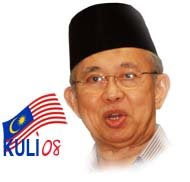Part 4: The Malaysian Insider looks at the impact the resignation of Tun Dr Mahathir Mohamad has on the major players in Umno. The spotlight today is on Tengku Razaleigh Hamzah.
Tengku Razaleigh Hamzah shows patience and persistence. — Bernama picKUALA LUMPUR, May 27 — He has been chugging along quietly, bringing his message of renewal and a better Malaysia to different parts of the country, from run down school halls to the swanky Sutera Harbour Resort in Kota Kinabalu.
Sometimes the audience is in the hundreds, rarely does it breach the 2,000 mark. He hardly gets a mention in the newspapers and is still not considered a serious contender for the ultimate prize in Malaysian politics – the presidency of Umno.
But Tengku Razaleigh Hamzah has caught the attention of the de facto Opposition leader Datuk Seri Anwar Ibrahim. The former deputy prime minister likes the big picture quality of Ku Li’s message to Umno members.
In an interview with Asia Inc. he said: "A lot of people consider Tengku Razaleigh as a has-been. But don’t forget he was in the Opposition for nearly 10 years so he has the experience of fighting from the outside. He was finance minister for a long time so he understands the economy. And I think of all the Umno leaders, he actually gets it because he is talking about real change. He thinks it should appeal to all Malaysians rather than just Malays. He can be a formidable opponent."
Members of Anwar’s camp say that he is not looking at the Kelantan prince as an opponent but an ally, a valuable addition to the Pakatan Rakyat – someone who with his royal credentials would be acceptable to the Malay Rulers, a key power centre in the new Malaysia. Someone who with his credentials could persuade Umno politicians to cross over to the Opposition and legitimise the PKR-Pas-DAP government in the eyes of the Malay electorate.
Someone with the gravitas sorely needed by the Opposition.
It is unclear if Anwar’s camp or anyone in the Opposition has made any overtures to Ku Li but the Umno veteran’s aides say that he is an Umno man and is not keen on achieving power outside of elections or through unconstitutional means.
Also, he believes that his campaign to reach out to the party’s grassroots is getting traction. And with Dr Mahathir’s resignation and his campaign to force Prime Minister Datuk Abdullah Ahmad Badawi likely to hit overdrive soon, Ku Li stands an improved chance of getting the precious 58 nominations from Umno divisions needed to contest the party president’s position.
What makes Tengku Razaleigh appealing to the neutral is his inclusiveness and sharp mind. He speaks about the need to preserve the Malay language and assures Malays that their special rights are protected by the Constitution. But he is also prepared to leave the safe zone and blast Umno members for their arrogance and addiction to power and patronage.
So far, he has not played the race card and was uneasy hearing the pitch Dr Mahathir took in Johor a week ago when the former prime minister cautioned the Malays about the demands being made by some non-Malay groups such as the Hindu Rights Action Force.
On Saturday night in Sabah, he spoke the language of change, calling on the people in the East Malaysian state to show their famous independent streak and change their own circumstances. He agreed that there should be a review of oil royalties paid to Sabah; said that Sabah should have its own gas plant and that qualified Sabahans should be promoted to top civil service positions across the country.
Ku Li also proposed that it was time to review the 1948 tax agreement. This legislation gave all powers of taxation to the federal government and with states only given capital, growth and other grants. And then for the first since he began his campaign of renewal after the March 8 elections, he told the branch chiefs that if they had confidence in him, they should translate it to nominations at the divisional meetings.
He also made a case for making Umno more democratic. Umno should democratise, with leadership and representation both in party and Parliament to be determined locally than from the top. State liaison chiefs should be elected by the divisions rather than by the president. Delegates to the AGM should be elected by members, not appointed by division chiefs, he suggested.
"Our party is no longer democratic. We have lost our sense of mission and struggle. The Umno culture has become sycophantic and fearful, dominated from above. Our highest value is now money," he said, adding that he had called for an extraordinary meeting to consider proposals that will return powers of selecting leaders to the grassroots.
Stirring speech aside, Ku Li still has an Everest to scale. The idealism of the party’s founding members that he preaches about no longer courses through the veins of this vintage. It has been replaced by pragmatism and self-interest.
Umno has become a business and only those leaders who can keep members contented with a steady diet of projects and positions are supported. Worse yet, the levers of power in the party are controlled by the 193 division chiefs, state liaison chiefs, supreme council members and the party president. Only a major amendment to the party constitution could return power to the rank-and-file as Tengku Razaleigh suggests.
But the electoral college consists of division chiefs, their nominees, supreme council members, etc. It is not in their interest to upset the status quo.
Sunday, June 1, 2008
Subscribe to:
Post Comments (Atom)


No comments:
Post a Comment